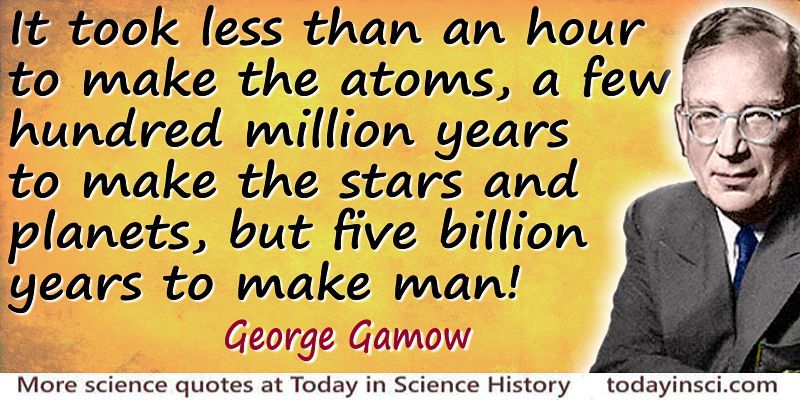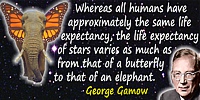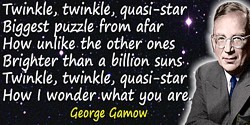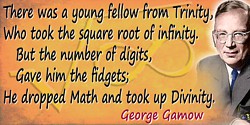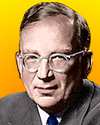 (source)
(source)
|
George Gamow
(4 Mar 1904 - 19 Aug 1968)
Russian-American nuclear physicist, cosmologist and writer who embraced the Big Bang Theory to explain the origin of the universe. Later in his career, he broadened his field of study into biochemistry, DNA and genetic theory.
|
George Gamow
“Five billion years to make man”
Illustrated Quote - Large (800 x 400 px)
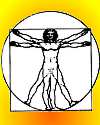
More George Gamow quotes on science >>
This quote comes from George Gamow’s book, The Creation of the Universe (1952), in which he was a strong advocate for the Big Bang theory of cosmogony. In the first chapter, he considered “Evolution Versus Permanence” in which he presented the evidence that the universe could not have existed for all time in a steady state. In subsequent chapters, he described the great expansion, the making of atoms, the hierarchy of condensations, and the “Private Lives of the Stars.”
In his conclusion, he contrasts the initial flurry of physical events at the origin of the universe with the eventual, and dramatic comparatively recent evolution of life as we know it:
Probably one of the most striking conclusions from our inquiry into the history of the universe is the fact that the main evolutionary events of physical development occupied only such a tiny fraction of the total period. This, of course, only means that organic evolution takes place at a much slower rate than the large-scale physical processes in the universe.
This was followed by the subject quote, written by Gamow as his final statement:
It took less than an hour to make the atoms, a few hundred million years to make the stars and planets, but five billion years to make man!
- Science Quotes by George Gamow.
- 4 Mar - short biography, births, deaths and events on date of Gamow's birth.
- George Gamow - context of quote “Five billion years to make man” - Medium image (500 x 250 px)
- George Gamow - context of quote “Twinkle, twinkle, quasi-star” - Medium image (500 x 250 px)
- George Gamow - context of quote “Twinkle, twinkle, quasi-star” - Large image (800 x 400 px)
- Mr Tompkins in Paperback, by George Gamow. - book suggestion.
